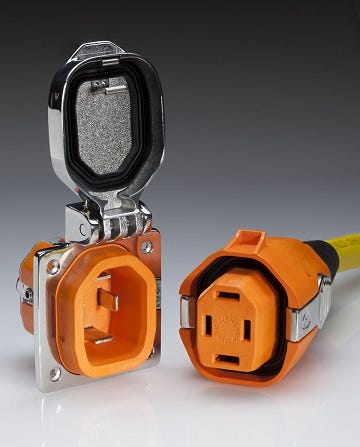When the makers of SmartPlug, a revolutionary shore power system for the marine industry, wanted to expand their product line to include a 50-amp version of their 30-amp SmartPlug power system, they needed to find a new thermoplastic material solution that would provide the necessary flame retardancy and impact resistance. They worked with custom compounder RTP Company (Winona, MN) who engineered a polycarbonate/polybutylene terephthalate (PC/PBT) alloy solution that met the electrical connectors requirements and regulatory approvals.
January 8, 2013
When the makers of SmartPlug, a revolutionary shore power system for the marine industry, wanted to expand their product line to include a 50-amp version of their 30-amp SmartPlug power system, they needed to find a new thermoplastic material solution that would provide the necessary flame retardancy and impact resistance. They worked with custom compounder RTP Company (Winona, MN) who engineered a polycarbonate/polybutylene terephthalate (PC/PBT) alloy solution that met the electrical connectors requirements and regulatory approvals.
In the marine environment where motion and moisture are a constant factor, loose connections or corrosion can easily lead to overheating -- the number one cause of shore power failure and fires. "In almost every case, the reason a boat is destroyed is the poor design of the shore power inlet on the boat," says Matt Smith, Vice President of Manufacturing for SmartPlug Systems (Seattle, WA). His father, a lifelong sailor with experience in rebuilding fire-damaged boats, knew he could invent a better solution and proceeded to create the SmartPlug power system that minimizes the tendencies toward loose electrical connections, corrosion, overheating and other problems inherent in other connector designs.
|
Color compound retains flame retardance with impact strength to boot. |
With the success of its 30-amp SmartPlug system in the marine, RV (recreational vehicle) and EMS (emergency medical service) vehicle markets, the company decided to develop a 50-amp version. This, however, proved to be a challenge for the SmartPlug team. Their original plastic supplier had a difficult time achieving the combined high levels of flame retardancy and impact resistance that the design demanded. The team was not happy with the extra wall thickness that using it would add to their design.
"We knew that in order to expand our line to a larger, heavier 50 amp version, we would need to find a better material solution," said Smith. The company's injection molder recommended custom compounder RTP Company. "RTP Company was helpful and knowledgeable and worked to understand our problem," said Smith.
"They said they would develop a solution, and they did." RTP Company produced an RTP 2000 Series custom PC/PBT alloy that incorporated glass fiber reinforcement along with a flame retardant to meet the UL94 V-0 flame rating and a UV stabilizer to achieve a UL746C f1 outdoor suitability rating.
"Not only did RTP Company get us both the strength and flame retardancy we needed for our larger, heavier SmartPlug, but they also did a great job of custom matching our existing vibrant orange color, even with all the modifiers," adds Smith.
The incumbent material was also a PC/PBT alloy. Custom compounding by RTP Company allowed the ratios of PC and PBT in the alloy to be modified so that critical impact performance was retained while additives were incorporated to obtain other needed properties, such as flame retardance and a custom color. "Compounding in additives, while imparting beneficial features, can degrade base resin performance. One of the crucial elements in formulating a custom compound is balancing all the necessary properties, which in the case of this application was retaining the impact performance of the PC/PBT alloy," notes RTP.
With the 50-amp product meeting approvals and heading to market, the SmartPlug team is planning to switch their 30-amp connector to the same RTP material to gain a higher margin of performance. In addition, according to Smith, the company has a 100-amp version in the works, and will be looking to RTP for another customer engineered thermoplastic material solution.-[email protected]
About the Author(s)
You May Also Like



